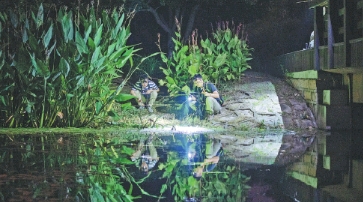A hobby that benefits science


The concept of citizen science, in which members of the public help experts gather data for scientific research, dates back to at least 1900 when the National Audubon Society in the United States proposed an annual Christmas bird count.
New technologies have since made this initiative more prevalent. Society's growing interest and awareness of the importance of the natural environment has also fueled its popularity in China.
According to Chen Lin, the project manager of the One Planet Foundation, the organization has a project in Tianshan Mountain in Xinjiang Uygur autonomous region where local communities have been encouraged to help with the monitoring of snow leopards.
Last summer, the Shanghai Natural History Museum launched a mobile application called Tingyouchong, which literally means "listen, there is an insect" in Chinese.
People can use the app to upload photos of insects, the sounds emitted by them and the location in which they were found. The app will then reply with possible answers to their identities. Unique samples will also be reviewed by researchers and added to a database.
On Aug 15, the museum launched an upgraded version of the app-it is now called Find Nature-to include amphibians, reptiles, mammals and birds.
Yuan Xiao, deputy head of the Shanghai Wildlife Protection and Management Administration, says that researchers at the Shanghai Chenshan Botanical Garden once took five years to finish a citywide investigation of plants.
"If they received help from the citizens, the work might have been completed in just one year," he says.
Yuan says the contribution of citizen scientists is extremely helpful to administrators.
"Previously, field work, such as wildlife monitoring, was performed only by experts in universities or institutions. But, with limited human resources, only a few places in the city could be monitored,"Yuan says.
"The data gathered by citizens covers the whole city, and this provides valuable information for us."
Wang Tianhou, a professor of ecology at East China Normal University, shares the same sentiment. He points out that another group of citizen scientists have emerged in China recently.
The ornithology group, called the Wild Bird Society of Shanghai, has also been of great help to scientists, he adds.
"There are also societies for insects and frogs, and I am glad the museum has created this new platform to gather people around nature," he says.
"It lets people know that everyone can be a scientist and contribute to important research."




































